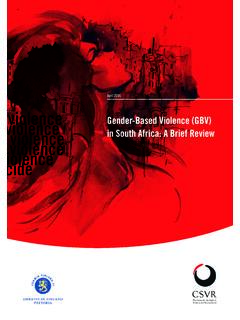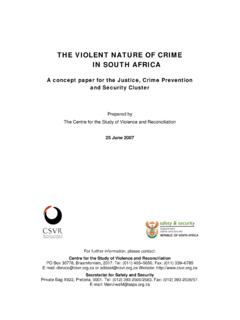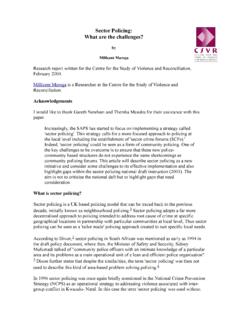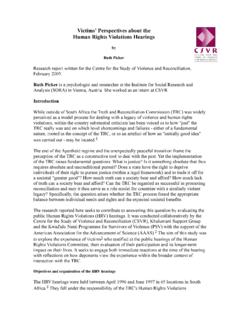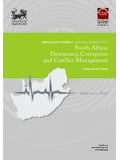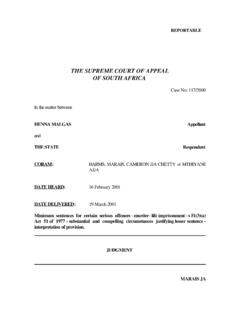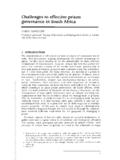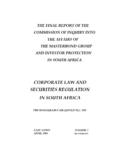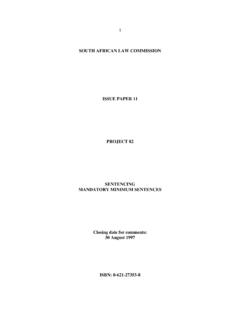Transcription of Municipal Policing in South Africa: Development …
1 Municipal Policing in South Africa: Development and ChallengesbyJanine Rauch, Mark Shaw & Antoinette Louw Institute for Security Studies Monograph No. 67, November Rauch is an independent Shaw is a Research Fellow at the South African Institute for International Affairs (SAIIA) at the University of the Louw is head of the Crime and Justice Programme at the Institute for Security SummaryChapter 1 Origins of Municipal PolicingApartheid's ' Municipal police'Traffic Policing at Municipal levelThe Durban City Police: 1854-2000 Chapter 2 Legislative and Policy DevelopmentsFoundations: the constitution and SAPS Act of 1995 Gauteng province takes the initiative: the 1996 Green PaperNational government provides enabling legislationMunicipal Policing catches on: popular and political supportChapter 3 Structure and Functioning of a Municipal Police ServiceOutline of legislation governing Municipal policingThe process of establishing a Municipal police serviceFramework of Policing in South africa and role of Municipal policeLaw enforcement by the Municipal policeCrime prevention by the Municipal policeChapter 4 Municipal Police Services in South AfricaDurbanJohannesburgPretoriaCape TownOther cities and townsChapter 5 Key challenges for Establishing Municipal PolicingNotesAcknowledgementsThis research is funded by the European Union, USAID.
2 The Ford Foundation and Standard Bank for the Criminal Justice Monitor project at the SummaryThis monograph traces the origins and Development of Municipal Policing in South africa from the infamous ' Municipal police' in apartheid South africa 's townships, to the respected Durban City Police a self-styled British constabulary that operated in the city from 1854 to 2000 when it was replaced by the Durban Metropolitan Police Service, established under the South African Police Service Amendment Act No 83 of 1998 which allows any municipality to apply for the establishment of a Municipal police the example of the Durban Metro Council, most of the other metros in South africa are in various stages of establishing their own police service. Politicians have generated extensive media coverage and public interest in Municipal Policing and some have made extravagant promises about the contribution that Municipal Policing will make to reduce crime.
3 Given that most existing Municipal police services are focusing largely on traffic enforcement or on work in only certain parts of the city, those expectations are unlikely to be met in the short monograph aims to clarify the functions of a Municipal police service and the challenges they are likely to face in fulfilling these. The monograph is based on research carried out independently by the authors over a period of several years. It provides an up-to-date picture of developments in Durban, Johannesburg, Pretoria and Cape Town, as well as the complex, lengthy and costly process required for establishing a Municipal police statutory functions of a Municipal police service (MPS) are traffic Policing , Policing of Municipal by-laws and regulations and preventing crime. The MPS will not conduct criminal investigations.
4 After arresting any person on suspicion of having committed a criminal offence, the arrested person will be taken to a SAPS police station as soon as possible. This interface between the MPS and the SAPS will be of the key challenges facing South African cities in the establishment of metropolitan police services are: Clarifying the role and mandate of the MPS particularly as it relates to crime prevention and co-ordination with the SAPS. Balancing enforcement and crime prevention activities. Both of these activities are equally weighted in the legislative mandate to metropolitan police services. Existing MPS's are focussing almost entirely on traffic enforcement and traditional law enforcement methods of combating crime, with little attention given to prevention. Determining the extent to which MPS officers will act as 'peace officers' and enforce by-laws and legislation.
5 This will involve determining the range of legislation which Municipal police officers will have to enforce, and ensuring that they are sufficiently skilled to perform all these functions. Training in crime prevention and enforcement of by-laws and legislation (other than traffic legislation) should be prioritised. Transforming the organisational culture from specialist enforcement (such as traffic or planning enforcement) to more generalist community Policing approaches. The MPS will face a steep learning curve in building effective community partnerships for safety. Financing a MPS. Municipalities wishing to establish Metro Police Services will need to find increased resources for public safety provision, without direct financial assistance from the national fiscus. In some municipalities, additional levies have been proposed.
6 It remains to be seen whether local ratepayers will be willing to pay more in order to have a local police service. Dealing with demands to include former combatants. Many municipalities are facing political pressure to incorporate former members of the liberation armies in their new police services. This issue has already been faced by the SAPS, without much success. Ensuring political independence of local police services. The SAPS has undergone a painful process of transformation over the past decade, central to which has been the idea of de-politicising the police function in South africa . Elected councillors and executive mayors will need to learn the same lessons about reducing political interference in operational Policing as have their counterparts in the national and provincial legislatures. The effective enforcement of by-laws.
7 By-law enforcement could be used to address the 'broken window' syndrome of urban disorder and fear. However, this will require Metro Police Officers to enforce a wide range of by-laws, and Municipal courts which are able to impose strict penalties for by-law infringements. Meeting public expectations. Given that existing MPS are focussing on traffic enforcement, expectations about crime reductions are unlikely to be met in the short term. The provision of visible Policing , whether or not it impacts upon crime, is a central challenge facing Municipal police managers. Only by being on the street, and being seen to act professionally, will the MPS make an impact on public perceptions of fear and safety. Maintaining standards. There is likely to be a great deal of scrutiny of Municipal police agencies in this early phase.
8 This places pressure on managers to ensure that problems like bribery, corruption, excessive use of force, inappropriate treatment of victims of crime, and racism are minimised, and dealt with in a decisive 1 Origins of Municipal PolicingThe term ' Municipal police' still has negative connotations for many South Africans, given that it was first used to describe the poorly trained and often violent 'policemen' deployed by the apartheid government in townships in the 1980s. Other than their name however, these police have nothing in common with today's Municipal police. The origins of the current Municipal police are more appropriately traced back to the traffic departments established at local government level in the 1930s and the unique 146 year-old Durban City 's ' Municipal police'During the 1980s one of the South African Police's (SAP) responses to the growing political resistance within the country was to hastily train groups of men who were deployed in the townships as guards and 'policemen'.
9 They were termed ' Municipal police' given that they replaced the so-called 'blackjack' police forces run by local administration boards and controlled by local government. The new ' Municipal police' however had greater powers and unlike their predecessors were often Accountable control over these institutions was only nominal and they fell under the command of the policemen, of whom there were 14 000 by the late 1980s, were used primarily to guard government installations in townships although they were often used for other more violent purposes. Thus they gained a reputation for "high levels of excessive and inappropriate use of violence, often arising out of drunken behaviour, ill-discipline and personal vendettas".2 The Municipal police themselves often created more problems than they solved for the SAP who had to intervene to police riots and at least on one occasion a mutiny.
10 Between August 1987 and April 1988, 349 Municipal police were charged with serious crimes including murder, robbery, assault, theft and this history, a comparison with Municipal Policing in post-apartheid South africa is disingenuous as no one contemplated building on this old system of apartheid control. That did not however stop some South African Police Service (SAPS) managers from making the comparisons and warning that 'reintroducing' Municipal police would lead to a "second class police agency". Ironically the apartheid inspired Municipal police members were incorporated into the SAP in comparison stuck however and at least for a period those at local government level who were lobbying for greater Policing powers used the more political neutral terms 'metropolitan police' or 'city police' rather than ' Municipal police' with its negative past Policing at Municipal LevelApart from apartheid's so-called Municipal police (who were not funded by or accountable to local government)
